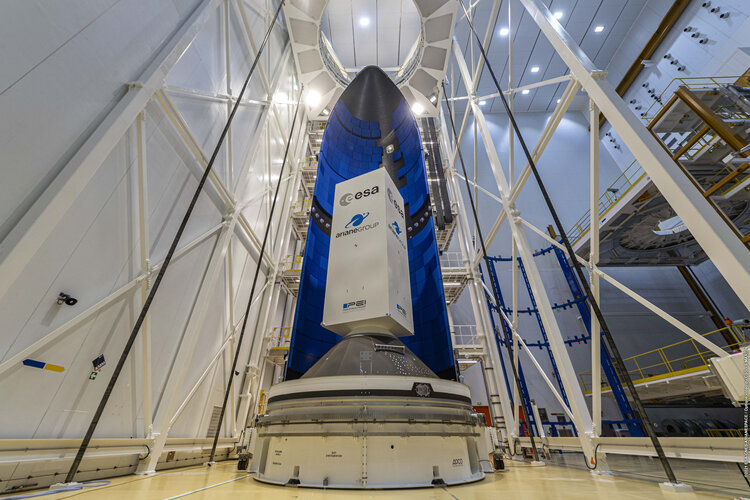Europe’s Spaceport in French Guiana is carrying out combined tests to prepare for the arrival of Ariane 6, Europe’s next generation heavy-lift launch vehicle.
The first Ariane 6 fairing has already arrived at the Spaceport from Europe. It is 20 m high and 5.4 m in diameter and is being integrated with a mockup payload to test equipment and procedures inside the assembly building.
Ruag Space in Emmen, Switzerland manufactures each entire large half-shell in one piece from carbon-fibre composite which is ‘cured’ in an industrial oven. This reduces cost and speeds up production. Fewer parts allow horizontal as well as vertical assembly of the closed fairing and the launch vehicle, which is particularly important for Ariane 6.
A blue metal scaffold on the right of the picture, called the ‘strongback’, encases the fairing. There is one for each half-shell to hold each steady and to maintain the shape of the fairing while it is being raised vertical, and during assembly.
The mockup payload stands on its payload adaptor – the black cone. This is the interface between the bottom of the payload and the rocket. The adapter cone is fixed to a permanent dock on the ground.
Before this combined test, the French space agency, CNES, updated the existing Ariane 5 assembly building with a new integration dock, composed of a large white frame, with two mobile platforms adjustable to any level and accessible by fixed stairs and platforms.
This assembly building has two halls: one for integration of the fairing on the Ariane 5 rocket, and an encapsulation hall where the payload is stowed in the fairing. This encapsulation hall is a spacious clean room for Ariane 6.
A new door 26 m high has been installed at the entrance of the building to make room for the integrated fairing, payload and adapter to move on its trailer to the Ariane 6 launch zone.
This activity is one of many extensive ‘combined tests’ which are being carried out in a team effort at the Spaceport by ESA, CNES, ArianeGroup, Avio and other industry partners. These tests will prove the systems and procedures that will prepare Europe's new Ariane 6 launch vehicle for flight.



 Image:
First Ariane 6 fairing at Europe’s Spaceport
Image:
First Ariane 6 fairing at Europe’s Spaceport